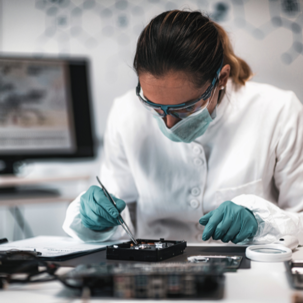A jury in Florida acquitted a doctor who had been accused of sexual battery; a patient claimed that the doctor had touched her inappropriately and without her consent during a doctor’s appointment three years before the trial. The only witnesses who testified at the trial were the accuser, the defendant, and a police detective who had investigated the case. Verbal testimony alone was not enough to persuade the jury beyond a reasonable doubt that the defendant was guilty. “He said, she said,” evidence is usually not enough to convict a defendant in a sex crime case; a criminal trial is not a tabloid news site. In most sex crime cases that go to trial, the verdict comes down to physical evidence and experts’ interpretation of it. A Texas sex crime attorney can help you persuade the jury that the prosecution is using to support its allegations against you does not necessarily indicate that the accusations against you are true.
What Is Forensic Evidence?
Forensic evidence is any evidence used in a legal case that can only meaningfully be used to indicate a defendant’s innocence or guilt if an expert uses scientific knowledge to interpret it. If detectives find a knife at a crime scene, it is physical evidence. If an expert determines that the accuser’s injuries look like they were caused by that knife as opposed to a different knife, it is forensic evidence. Likewise, if police found a bag of white powder in a defendant’s car, that is physical evidence, but if the crime lab tested it, and an employee of the crime lab testifies that the powder was cocaine, that is forensic evidence.
The following are types of forensic evidence:
· Reports about whether fingerprints found at the scene of the crime match the defendant’s fingerprints
· Analysis of substances found in the defendant’s possession were illegal drugs, poisons, or chemicals used to conceal evidence of crimes
· Expert witness testimony by a physician about the presumed causes of an accuser’s injuries
· Toxicology tests that show whether a defendant was under the influence of drugs at the time of the alleged crime
To say that the availability of DNA testing has revolutionized forensic science is an understatement. It is possible to tell with very high accuracy the identity of people whose blood, skin cells, or semen were found at crime scenes, even years after the crimes occurred. Every person sheds numerous skin cells every day, so if you went somewhere more recently than the place has been thoroughly cleaned, your skin cells are probably there. If skin cells found in an accuser’s car match a defendant’s DNA, this only means that the defendant rode in the accuser’s car at some point before the investigation. If semen found in the car matches the DNA of the accuser, it means that the defendant engaged in a sexual act in the car. It cannot, however, prove whether the sexual act was consensual.
Contact the Law Office of Patrick J. McLain, PLLC About Criminal Defense Cases
A criminal defense lawyer can help you establish reasonable doubt about the forensic evidence that the prosecution is trying to use against you. Contact the Law Office of Patrick J. McLain, PLLC, in Dallas, Texas, to discuss your case.

